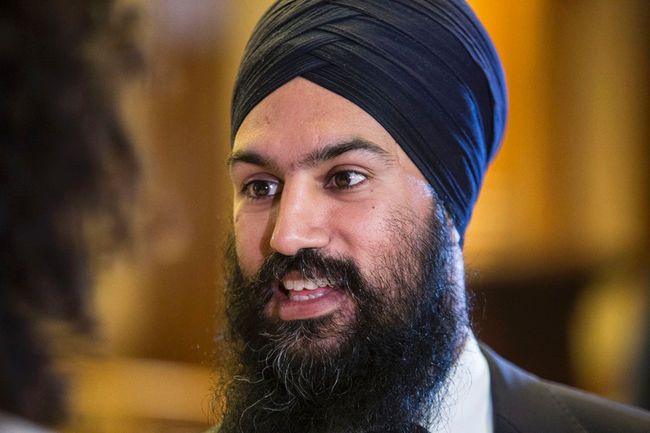The federal New Democratic Party might soon have to change its name to "Junior Liberal Party."
OK, that's kind of a joke, but it also kind of isn't.
After all, some in the media have already dubbed the NDP as the Liberal Party's "junior partner", due to how it recently propped up Prime Minister Justin Trudeau's government to stave off a federal election.
But I'm also beginning to wonder if the NDP's subservient status to the Liberals goes beyond the dynamics of today's minority government situation.
In other words, it could be, given the political times we're in, that the NDP will never become anything more than just a "junior" political version of the Liberals.
Certainly, that's the case in the short term.
Just consider the facts: the NDP is low on cash, it has a leader Jagmeet Singh — who still hasn't caught on with Canadian voters; it's facing a Liberal Party, which has shamelessly co-opted many of its left-wing policies.
Is it any wonder Singh didn't want to pull the plug on the government and trigger an election?
I mean, the NDP forcing a federal election right now to take on the Liberals and Conservatives, would be like Titanic challenging two icebergs.
But, you might be saying, circumstances can change quickly in politics — maybe the economy will tank, maybe Trudeau's popularity will finally fizzle out, maybe Singh will eventually be replaced by a charismatic leader — so it's possible that a year or two from now, the situation for the New Democrats might be a lot better.
To that, I'd respond yes, it's surely possible the NDP will one day match the Liberals as an equal, but, in my view, that's not likely to happen any time soon.
If ever.
As matter of fact, my sense is the NDP faces problems that go beyond leadership issues and fundraising woes; to my mind, the NDP's real dilemma is that it suffers from what I'd call, a "celebrity deficit".
What does that mean?
Well, it means for a leftist political party to succeed these days it needs plenty of celebrity attention, which is to say it needs the endorsement of a tech billionaire or Hollywood actors or famous media personalities.
But to be popular with the influential and powerful ruling classes, a party must promote a kind of leftism that's fashionable enough to upset "rednecks" but not too radical so as to threaten the privileges enjoyed by the elites.
This goes a long way to explaining Trudeau's ongoing appeal with elites; not only does he energetically espouse whatever progressive cause happens to be trendy, but he also does so in a way that will never challenge the interests of Canada's "Laurentian elites."
Just as importantly, Trudeau is himself an elite.
By contrast, the NDP still has its radical socialist/populist roots, which makes it a little too frightening to be fashionable with the upper classes and, just as importantly, it's a party which comes from the wrong side of the cultural tracks.
Keep in mind, the NDP's base includes small town populists and urban blue-collar workers, not the kind of people usually invited to attend wine and cheese parties held in swanky Rosedale mansions to discuss the nuances of intersectional feminism.
Basically, most celebrities would rather sip champagne with Greta Thunberg then share a beer with a factory worker or, for that matter, any other member of the unwashed proletariat.
Heck, even in 2011 when the NDP was arguably at its peak in popularity, when it had a charismatic leader in Jack Layton, and had leapfrogged ahead of the Liberals in the House of Commons thanks to an unprecedented "Orange wave", the elites still refused to embrace New Democrats.
Recall, back then the big argument from the mainstream media was "let's unite the left", i.e. merge the Liberals and NDP into a single entity.
The purpose behind this strategy, of course, was to ensure the cultural barbarians in the NDP would be put under Liberal control.
Mind you, there are some New Democrats who manage to briefly enjoy elite approval.
Former Alberta Premier, Rachel Notley, for example, was cheered in Central Canada's elite circles, but only because she allied herself with the Trudeau Liberals, a policy which arguably hurt her own province, and which ultimately led to her electoral demise.
And this illustrates the strategic problem for the New Democrats.
The more they try to pander to the ruling classes by embracing trendy elitist policies, the more they risk alienating their own non-elitist base.
Indeed, the collapse of the U.K.'s Labour Party in the last British election offers a cautionary tale of what can happen to a socialist party that pushes trendy causes rather than working class/ populist values.
So yeah, given how the powerful will likely never really accept New Democrats, maybe the only future for the NDP is to be a political sidekick for the Liberals.
In which case, Junior Liberal Party would be a pretty good name, right?
Photo Credit: CBC News






